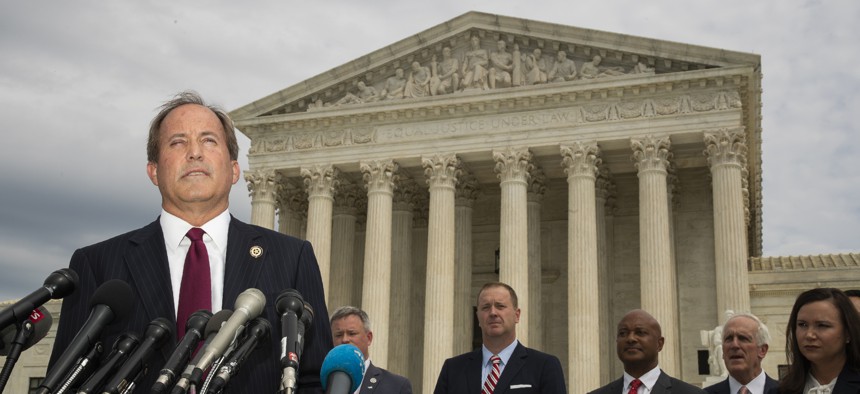How States Are Battling Other States’ Travel Bans

Texas Attorney General Ken Paxton and a bipartisan group of state attorneys general speaks to reporters in front of the U.S. Supreme Court in Washington, on Monday, Sept. 9, 2019. AP Photo/Manuel Balce Ceneta
Texas is asking the U.S. Supreme Court to declare California’s ban on state-funded travel to the Lone Star state unconstitutional.
A recent trend in state government is for lawmakers to express their displeasure with another state’s policies—typically those they view as discriminatory—by prohibiting public employee travel to the offending state.
That’s the path California took in 2017 against Oklahoma after the state adopted a law that allows adoption agencies to deny placement services to same-sex parents.
Oklahoma responded in kind last month with its own retaliatory ban prohibiting state-funded travel to California. Gov. Kevin Stitt accused California of trying to “politically threaten and intimidate Oklahomans for their personal values.”
But another state is now looking to put a stop to these types of travel bans.
Texas is one of 12 states on California’s list of banned places for state-funded travel over laws the attorney general’s office has determined discriminate against gay or transgender people.
Texas Attorney General Ken Paxton this week filed a complaint asking the U.S. Supreme Court to find California’s travel ban against his state unconstitutional.
“Boycotting states based on nothing more than political disagreement breaks down the ability of states to serve as laboratories of democracy while still working together as one nation—the very thing our Constitution intended to prevent,” Paxton said in a statement.
The complaint alleges that California’s law was rooted in religious animus and violates the Constitution’s Interstate Commerce Clause and Equal Protection Clause.
“The express aim of California’s travel ban is to punish the citizens and businesses of the target States to pressure those States ‘to change their laws’ to provide fewer protections for religious freedom,” the complaint states.
The Supreme Court is not typically the first stop for litigation. Cases generally have to work their way through the lower courts before being appealed to the Supreme Court, but lawsuits involving civil disputes between states can be filed directly with the high court.
The Texas complaint cites two instances in which California’s travel ban has prevented students and academics at public universities from visiting the state to attend conferences.
Students at California Polytechnic State University were unable to obtain funding to attend the 2017 National Organization of Minority Architects conference in Houston as a result of the ban. In 2019, scholars from public universities in California were unable to participate in the Association for Women in Mathematics research symposium at Rice University.
A spokeswoman for the California Attorney General’s Office said the office was reviewing the Texas complaint.
“In California, we simply oppose using taxpayer money to support states that pass laws discriminating against the LGBTQ community,” spokeswoman Sarah Lovenheim said.
State travel bans are nothing new, but reaction to them has varied.
California lawmakers and university athletic teams have found other ways to travel to banned states in the past, tapping campaign funds or pursuing private donations to pay for their trips, the Los Angeles Times reported last year.
In some instances, bans have led states to amend their laws.
Indiana faced travel bans by New York, Connecticut and Washington after adoption of the Religious Freedom Restoration Act (RFRA), which critics argued could be used to deny service to gay customers. The law was amended within two days of adoption and the state travel bans were dropped. But some believe the economic damage to the state as a result of the uproar over the bill was long-lasting.
The state’s capital, Indianapolis, lost out on conventions and sporting events for 13 months after the law was initially passed, said Chris Gahl, vice president of marketing and communications at Visit Indy, the city’s convention and visitors' bureau. That cost the city approximately $60 million.
“The tourism crisis we felt and saw in 2015 as a result of Indiana’s RFRA being signed was significant in terms of lost business,” Gahl said.
If the law has been left on the books, “there was real fear this was going to impede our ability to book conventions and sporting events, he said.
Andrea Noble is a staff correspondent with Route Fifty.
NEXT STORY: Conservative Indiana Adopted Needle Exchanges But Still Faces Local Resistance





